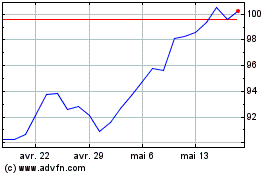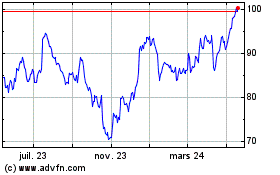Morgan Stanley Study Unpacks Plan Sponsor Trends Amid Increasing Demand for Consultancy Services
21 Octobre 2024 - 3:30PM
Business Wire
• 80% of plan sponsors surveyed are using consultants in
managing retirement plans
• Trends indicate preference is tipping toward higher-touch
services
• Fund lineup and participant education singled out as strategic
priorities
Morgan Stanley today announced results of its 2024 Retirement
Plan Survey, providing insight into shifting 401(k) plan sponsor
attitudes and tactics amid a constantly evolving financial
landscape.
Retirement benefits remain essential for attracting and
retaining employees, but as markets grow more complex, so do
demands on defined contribution (DC) plan sponsors to help
employees prepare for retirement. To compete, plan sponsors are
under pressure to offer attractive benefit packages that address
myriad employee needs and business demands. In response, most are
turning to consultants for support—and seeking more holistic
services.
Polling nearly 200 plan sponsor decision-makers with 401(k)
plans with at least $50 million in assets—and 56 from organizations
with 401(k) plans with more than $1 billion—the survey provides a
comprehensive look at how retirement leaders are approaching their
choices around selecting support, investment lineups and strategies
for engaging participants. Key insights include:
1. Consultant Relationships Are in Demand
- Reflecting the need for guidance in an increasingly complex
landscape, over 80% of plan sponsor respondents say they are
currently using a consultant.
- The structure of consultant arrangements is also shifting
toward higher-touch services: A 3(21) fiduciary acts as an
investment advisor who makes investment recommendations regarding
plan assets, while by contrast a 3(38) investment manager reviews
investment options, makes investment decisions, and ultimately
takes more fiduciary responsibility for the plan's day-to-day
investments. Today, 3(21) relationships are still nearly twice as
common as 3(38) relationships, (55% vs. 27%, respectively), but the
gap appears to be closing—with most 3(38) users beginning their
engagement within the past five years. In fact, nearly half of plan
sponsors are either highly (6%) or partly (42%) considering working
with a 3(38) investment manager.
- Among those not utilizing or considering a 3(38) investment
manager, satisfaction with their current approach was the primary
reason. On the other hand, top reasons plan sponsors cited for
considering the switch to a 3(38) investment manager include
reduced workload for executives, maximum investment liability
transfer under ERISA, and the 3(38) investment manager’s ability to
take immediate action for fund changes.
2. As Investment Lineups Expand, So Do Opportunities for
Support
- Though most plan sponsors are not currently seeking to increase
the number of asset managers they use, more than a third plan to
expand the number of investment options they offer. Yet, a quarter
cited challenges in changing their investment lineup, particularly
when it comes to participant communication, regulatory filings and
the cost of moving assets—indicating key areas where consultant
guidance adds value.
- Most retirement plan sponsors are adding or have added target
date funds with guaranteed payouts (71%), multi-asset strategies
(65%), and hybrid default investment options (56%) to their
offerings. Currently, 64% offer managed accounts, with another 22%
planning to do so. And despite initial hesitation, 41% of sponsors
now provide retirement income solutions—with an additional 44%
intending to introduce this option to help workers turning savings
into income post-retirement.
3. Participant Education Key to Success
- Given so much complexity, educational materials and other tools
to engage participants are very important to the success of
retirement plans, especially when adding new solutions. The top
three popular tools provided through a 401(k) include online
retirement planning tools (85%), online account review and analysis
tools (74%) and written education content (73%).
- Consultants and investment advisors are now the most common
source for participant educational resources, with nearly half of
plan sponsors turning to their consultants (47%) to provide these
services. This trend is expected to continue as consultants
increasingly incorporate participant education into their
offerings. Online tools are a favorite format, but nearly half of
sponsors also offer live training, either online or in-person.
- Many plan sponsors identified participant understanding and
involvement as key barriers to adding retirement income solutions
to their plans, stressing the need for education resources.
"Retirement plans are adapting to address both company and
employee needs, and our survey results show that it's not just
about improving financial results, but about doing what's best for
the future," said Jeremy France, Head of Institutional Consulting
Solutions at Morgan Stanley. “Plan sponsors are looking for a
variety of solutions to help them maintain competitive benefits,
foster employee understanding and fulfill fiduciary
responsibilities, but there’s no one-size-fits-all recipe. Instead,
we believe that it’s only through tailored guidance that
organizations can find the right blend of support, investment
options and education to unlock the full impact of their
plans.”
Morgan Stanley has built a robust offering across the full
spectrum of advice, workplace and self-directed solutions. Through
Institutional Consulting Solutions, comprehensive retirement
services include investment advice and solutions for institutional
investors; support for plan sponsors in managing retirement plans,
navigating regulations and educating employees; and plan
participant education and personalized guidance. For more
information, visit Morgan Stanley Institutional Consulting
Solutions.
The 2024 plan sponsor survey is the second in an annual series
from Morgan Stanley Wealth Management focused on insights into the
institutional landscape. The full 2024 survey results are available
here.
About Morgan Stanley Wealth Management
Morgan Stanley Wealth Management, a global leader, provides
access to a wide range of products and services to individuals,
businesses and institutions, including brokerage and investment
advisory services, financial and wealth planning, cash management
and lending products and services, annuities and insurance,
retirement and trust services.
About Morgan Stanley
Morgan Stanley (NYSE: MS) is a leading global financial services
firm providing a wide range of investment banking, securities,
wealth management and investment management services. With offices
in 42 countries, the Firm’s employees serve clients worldwide
including corporations, governments, institutions and individuals.
For further information about Morgan Stanley, please visit
www.morganstanley.com.
This has been prepared for informational purposes only and is
not a solicitation of any offer to buy or sell any security or
other financial instrument, or to participate in any trading
strategy. This material does not provide individually tailored
investment advice. It has been prepared without regard to the
individual financial circumstances and objectives of persons who
receive it. Morgan Stanley recommends that investors independently
evaluate particular investments and strategies and encourages
investors to seek the advice of a Financial Advisor.
When Morgan Stanley Smith Barney LLC, its affiliates and Morgan
Stanley Financial Advisors and Private Wealth Advisors
(collectively, “Morgan Stanley”) provide “investment advice”
regarding a retirement or welfare benefit plan account, an
individual retirement account or a Coverdell education savings
account (“Retirement Account”), Morgan Stanley is a “fiduciary” as
those terms are defined under the Employee Retirement Income
Security Act of 1974, as amended (“ERISA”), and/or the Internal
Revenue Code of 1986 (the “Code”), as applicable. When Morgan
Stanley provides investment education, takes orders on an
unsolicited basis or otherwise does not provide “investment
advice”, Morgan Stanley will not be considered a “fiduciary” under
ERISA and/or the Code. For more information regarding Morgan
Stanley’s role with respect to a Retirement Account, please visit
www.morganstanley.com/disclosures/dol. Tax laws are complex and
subject to change. Morgan Stanley does not provide tax or legal
advice. Individuals are encouraged to consult their tax and legal
advisors (a) before establishing a Retirement Account, and (b)
regarding any potential tax, ERISA and related consequences of any
investments or other transactions made with respect to a Retirement
Account.
Past performance is not a guarantee or indicative of future
performance. Historical data shown represents past performance and
does not guarantee comparable future results.
This material contains forward-looking statements and there can
be no guarantee that they will come to pass.
Diversification and asset allocation do not guarantee a profit
or protect against loss in a declining financial market.
This material should not be viewed as investment advice or
recommendations with respect to asset allocation or any particular
investment.
Morgan Stanley Wealth Management is the trade name of Morgan
Stanley Smith Barney LLC, a registered broker-dealer in the United
States.
© 2024 Morgan Stanley Smith Barney LLC. Member SIPC.
View source
version on businesswire.com: https://www.businesswire.com/news/home/20241017986889/en/
Media Relations: Susan Siering Susan.Siering@morganstanley.com;
Jeanne Joe Perrone Jeanne.Perrone@morganstanley.com
Morgan Stanley (NYSE:MS)
Graphique Historique de l'Action
De Déc 2024 à Jan 2025

Morgan Stanley (NYSE:MS)
Graphique Historique de l'Action
De Jan 2024 à Jan 2025
